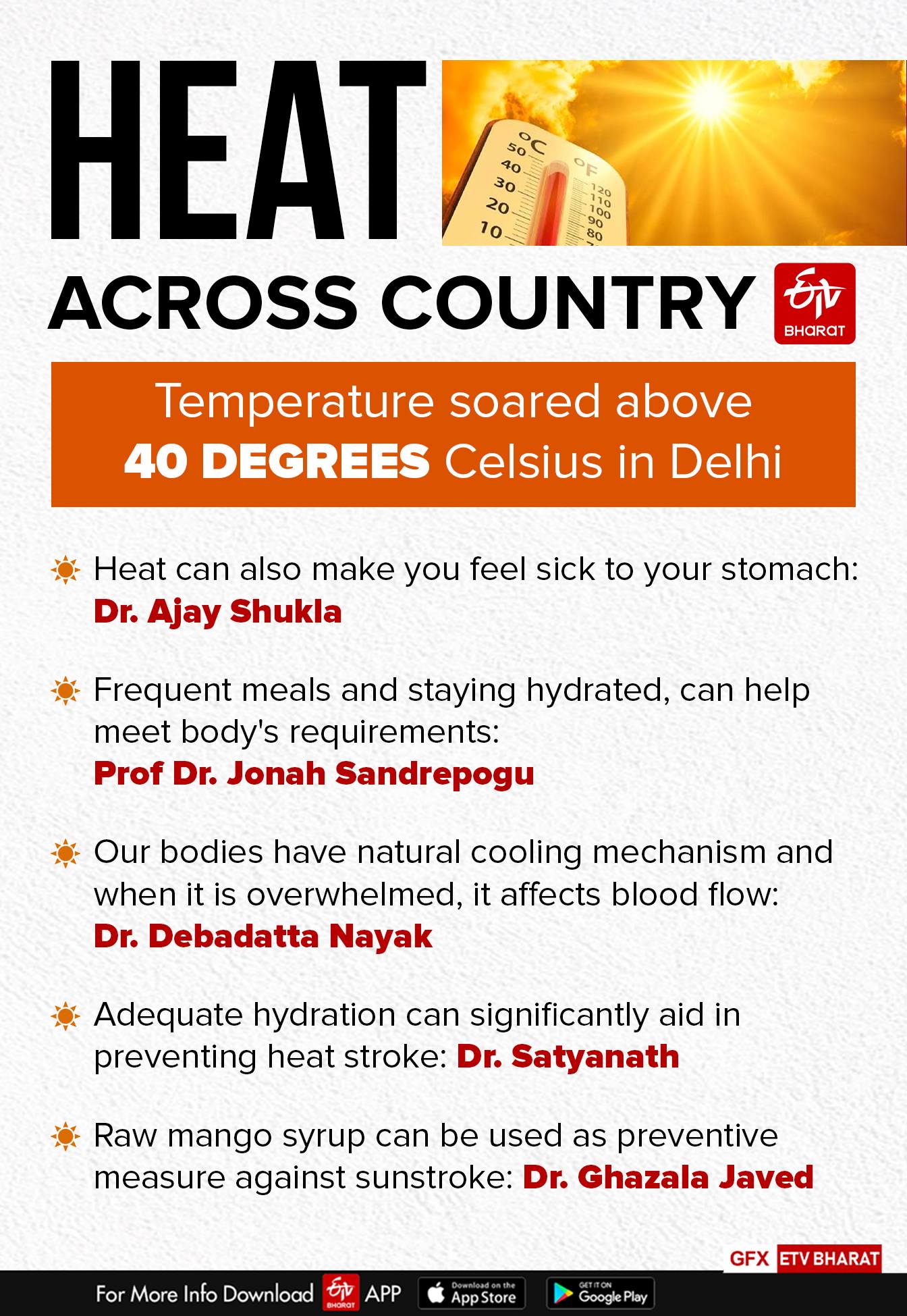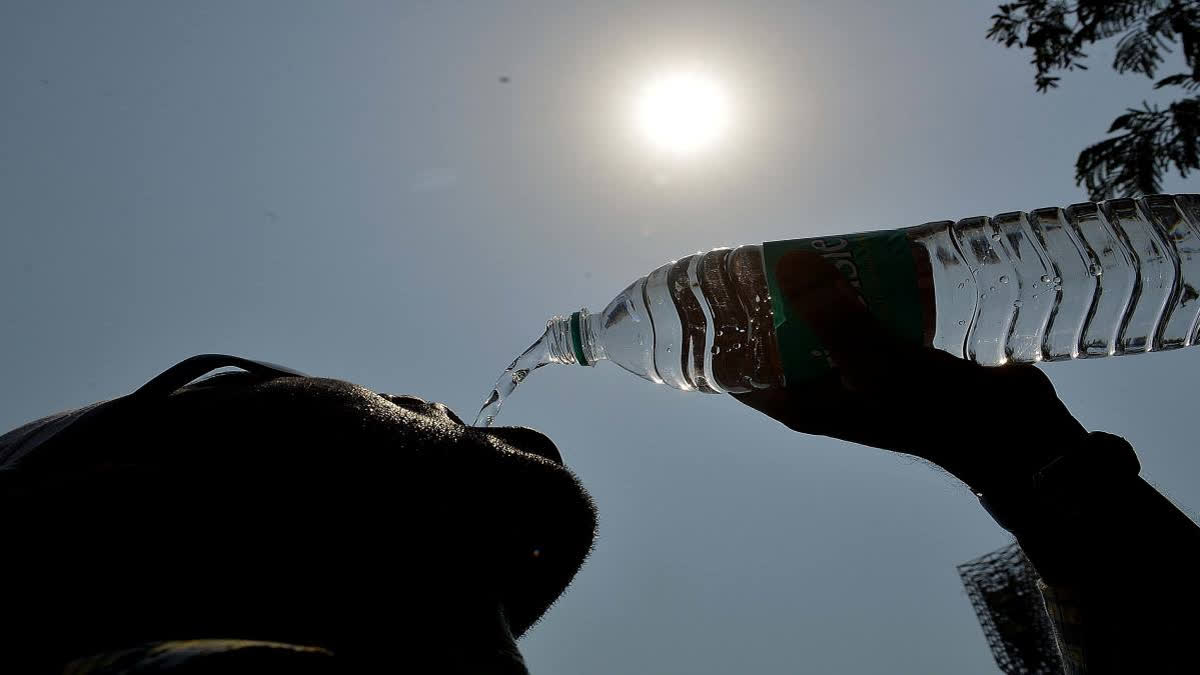
New Delhi: In many states across the country, summer has begun displaying its fierce intensity ahead of schedule. Despite some changes in weather patterns, with occasional clouds and light rain, temperatures soared above 40 degrees Celsius in Delhi last week. In response to this heat, both central and state governments have initiated preparations at their respective levels.
The Indian Meteorological Department on Monday issued a red heatwave alert in Jharkhand, Bihar, Odisha, and Gangetic West Bengal and a whole yellow alert in the northeastern states, Tamil Nadu, Telangana, and Gujarat.
Experts suggest that children, elderly, and those already undergoing treatment for serious illnesses need to be particularly cautious during this season. Additionally, others have been advised to avoid going outdoors during high temperatures unless absolutely necessary.
According to a global report from the International Labour Organisation titled "Ensuring Safety and Health at Work in a Changing Climate," climate change is already exerting serious impacts on the safety and health of workers in all regions of the world. Workers are among those most vulnerable to climate change hazards, yet often have no choice but to continue working, even in hazardous conditions.
Heat Impact worldwide
The report also finds that every year, an estimated 22.85 million occupational injuries, 18,970 deaths, and 2.09 million disability-adjusted life years are attributable to excessive heat alone. Many countries have implemented new laws specifically to address excessive heat in the working environment. These laws primarily include maximum temperature limits and guidelines for adaptive measures at the workplace level.
It is stated that maintaining a core body temperature of around 37 degrees Celsius is essential for continued normal body function. If the body temperature rises above 38°C, physical and cognitive functions are impaired; if it rises above 40.6°C, the risk of organ damage, loss of consciousness, and ultimately death increases sharply.
According to the report, longer-term impacts of chronic exposure to heat include cardiovascular disease, acute kidney injury, and chronic kidney disease, all of which are associated with hot working environments. Reports indicate that epidemics of chronic kidney disease of unknown etiology (CKDu) are affecting large numbers of workers engaged in heavy manual labor in hot temperatures. CKDu has emerged in hot, rural regions of the Americas, Africa, the Middle East, and India, where abnormally high numbers of agricultural workers have begun dying from irreversible kidney failure.
Steps to mitigate effects of extreme heat
To mitigate the impact on the workforce, different countries have adopted various strategies. In Spain, a Royal Decree-Law addresses issues caused by weather conditions and prevents labor risks during high temperatures.
In China, the Administrative Measures on Heatstroke Prevention, issued in 2012, mandate stopping outdoor activities for the day if the temperature reaches 40°C. Additionally, if the temperature is between 37°C and 40°C, employers must ensure that employees do not work outdoors for more than six hours in total in a day, especially during the three hours of the highest temperature period.
In Germany, if the room temperature exceeds 26°C, protection measures such as ventilation systems, flextime regulations to shift working hours, relaxation of clothing regulations, and the use of fans should be implemented.
In Greece, a national collective agreement for workers in the shipbuilding and repair sector states that work should be suspended from 2 p.m. to 6 p.m. when temperatures are between 36°C and 37°C, and from 1 p.m. to 7 p.m. when temperatures reach 38°C.
The United Arab Emirates Government has launched the “Safety in the Heat” program, focusing on educating workers and employers on effective strategies for managing excessive heat in the workplace. This includes hydration, salt intake, rest breaks, gradual adjustment to heat, reduced work demands, and monitoring of at-risk individuals, along with training on handling heat-related illnesses.
In India, the National Disaster Management Authority, in collaboration with the Ministry of Home Affairs, published the National Guidelines for Preparation of Action Plan - Prevention and Management of Heat Wave. These guidelines emphasize educating workers, ensuring proper hydration, regulating work schedules, providing necessary medical facilities, and rescheduling physically demanding jobs to cooler times of the day. Special attention is given to pregnant workers and those with underlying medical conditions, with recommendations for breathable, light-coloured clothing, hats, or umbrellas.
According to experts, heatstroke can be avoided through awareness and precautionary measures. Dr Ajay Shukla, Director and Medical Superintendent of Ram Manohar Lohia Hospital in Delhi told ETV Bharat that once when your body struggles to handle too much heat, you might notice that your breathing becomes rapid and shallow, and your heart starts racing, you feel extremely exhausted and light-headed, your heart rate goes up and you feel intense thirst. These are signs that you could be experiencing heat stroke. It's really important to get medical help quickly to prevent things from getting worse, like damage to your organs or worse still, death.
Heat can also make you feel sick to your stomach, with symptoms like nausea, vomiting, and stomach cramps. These discomforts can happen because your body is unable to bring down the internal temperature. If you don't get help, severe dehydration can make the risk of heat stroke and other heat-related issues even higher. One should ensure they stay hydrated with an adequate amount of fluids and electrolytes. Additionally, it's important to keep a close watch on any other symptoms Dr Shukla added.
In the rich tapestry of traditional Indian medicine, people have found many ways to protect themselves from extreme heat. Experts, speaking to ETV Bharat, have shared how individuals can safeguard themselves by embracing natural methods.
Ayurveda Tips
In an interview with ETV Bharat, Professor Dr. Jonah Sandrepogu from the All India Institute of Ayurveda in Delhi shared some practical insights. He explained how the rising temperatures not only affect us externally but also impact our body's metabolism. During such times, it's common to feel hungrier than usual. Dr Sandrepogu emphasized the importance of listening to our bodies and ensuring we provide it with adequate nourishment according to their needs.
He suggested that following Ayurvedic principles, such as eating small, frequent meals and staying well-hydrated, can help meet the body's requirements. This advice is especially relevant for those who have to venture out for work during the day.
Dr. Sandrepogu also highlighted that increased heat can lead to health issues like fever. It's crucial to prevent the body temperature from rising excessively. He recommended consuming energizing Ayurvedic beverages like Kharjuradi Mantha to replenish vital nutrients and maintain balance in the body.
Cure in Homeopathy
Dr. Debadatta Nayak, a scientist specializing in homoeopathy at the Central Council for Research, shared some insights with ETV Bharat that shed light on the human response to extreme heat. He explained that our bodies have a natural cooling mechanism: when exposed to high temperatures, we start sweating to keep our blood cool. However, when this mechanism is overwhelmed, it affects blood flow and triggers reactions within our cells.
Dr. Nayak said that if we don't swiftly bring down body temperature, it sets off a cascade of chemical releases that can harm various organs, with the brain and liver being especially vulnerable. He stressed that delaying this cooling management can increase the risk of mortality.
Moreover, he urged people experiencing cognitive or digestive issues to seek medical help promptly. Dr. Nayak emphasized the heightened vulnerability of individuals with conditions like diabetes and hypertension. He encouraged everyone to take precautions to stay cool and avoid prolonged exposure to extreme heat. While there may be homoeopathic remedies available, he emphasized the importance of consulting healthcare professionals before trying them out.
Naturopathy Way
Dr. Satyanath, a seasoned Medical Officer at the National Institute of Naturopathy in Pune, shared some practical insights with ETV Bharat. He explained that when people constantly feel thirsty but aren't sweating, it's a sign that their bodies lack water and essential minerals. He also highlighted the importance of dietary choices during hot weather, as they impact how well the body handles heat-related challenges. In today's fast-paced world, ensuring adequate hydration can significantly aid in preventing heat stroke.
Dr. Satyanath recommended coconut water as a natural remedy to replenish both minerals and fluids in the body. He emphasized the importance of keeping the body well-hydrated during the hot months, suggesting lighter meals and avoiding heavy, oily foods.
Furthermore, Dr. Satyanath pointed out that if someone isn't urinating 4-5 times during their waking hours or if their urine appears dark yellow, it indicates insufficient water intake or dehydration. These simple observations can help individuals gauge their hydration status and take necessary steps to maintain optimal fluid levels in the body.
Unani Expert's Advice
Dr. Ghazala Javed, Assistant Director at the Central Council for Research in Unani Medicine, offered valuable advice to ETV Bharat regarding coping with heat-related challenges. She recommended incorporating certain foods and drinks such as cucumber, watermelon, plums, pomegranate, spinach, buttermilk, lemon juice, and tender coconut water into one's diet to stay hydrated and refreshed during hot weather. Additionally, she suggested using raw mango syrup as a preventive measure against sunstroke.
Furthermore, she recommended incorporating Sattū syrup, a mixture of ground pulses and cereals, into one's daily morning routine to replenish fluids and electrolytes lost through sweating. Additionally, she advised considering the use of Sikanjabīn, a drink made from vinegar and honey, and Rub, dry extracts of sour fruits, to help cool the body.
Dr. Javed emphasized the importance of protecting oneself from the sun's harsh rays by covering the head and face with a cloth or using an umbrella when outdoors. This precaution can significantly reduce the risk of sunburn and heat-related illnesses.
She also stressed the importance of keeping infants under six months old out of direct sunlight and dressing babies and young children in lightweight, loose-fitting clothing made of breathable fabrics to prevent overheating.
Read More



